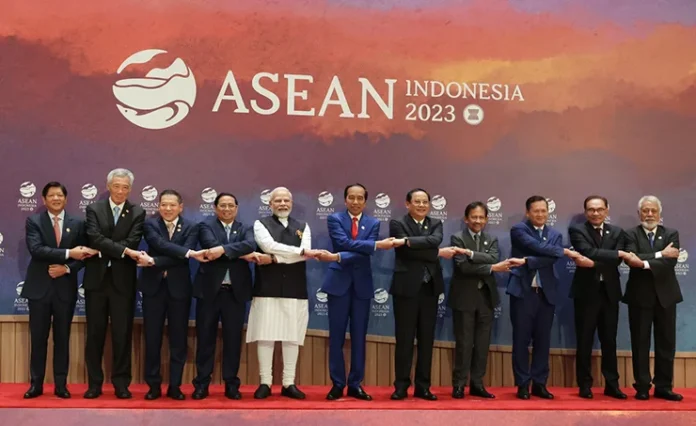Prime Minister Narendra Modi stated during the 20th ASEAN–India Summit on 7th September 2023 in Jakarta, Indonesia, that engagement with the Association of Southeast Asian Nations (ASEAN) constitutes a crucial aspect of India’s Act East Policy. He noted that, in the post-Covid era, there is a collective imperative to collaborate in order to ensure the freedom and openness of the Indo-Pacific region, establish an unimpeded maritime corridor, and amplify the voices of the Global South. The ASEAN occupies a significant position within India’s Indo-Pacific initiative, and India is resolutely committed to working hand in hand with its ASEAN partners.
The Prime Minister asserted that Asia will ascend in the 21st century, and together, they will contribute to reshaping the global order with the welfare and progress of their people in mind. He emphasized the importance of unity, standing resolutely together, and refusing to tolerate the dominance of a select few nations. Furthermore, he stressed the importance of unfettered movement within the South China Sea and underscored the necessity of respecting the sovereignty of all nations, regardless of their size.
Prime Minister Modi subsequently returned to India on 8th September, citing his obligation to attend the G20 Summit, which was being hosted in New Delhi.
ASEAN, or the Association of Southeast Asian Nations, comprises 10 South Eastern Asian nations: Indonesia, Malaysia, Philippines, Singapore, Thailand, Brunei Darussalam, Laos, Cambodia, Myanmar, and Vietnam. Conceived on 8th August 1967, ASEAN’s origins can be traced to a historic gathering in Bangkok. Here’s a glimpse into its inception and growth:
Birth in Bangkok: ASEAN’s journey began on 8th August 1967 when the foreign ministers of Indonesia, Malaysia, Philippines, Singapore, and Thailand met in Bangkok. They convened to address contentious issues between Malaysia, Indonesia, and the Philippines. Thailand played a crucial role as a peacemaker, eventually leading to a unanimous resolution. The five foreign ministers—Adam Malik (Indonesia), Tun Abdul Razak (Malaysia), Narciso Ramos (Philippines), S Rajaratnam (Singapore), and Thannat Khoman (Thailand)—were hailed as the founding fathers of ASEAN, and the document they signed became known as the ASEAN Declaration.
Expansion: Over the ensuing decades, five more countries joined the group: Vietnam, Cambodia, Laos, Myanmar, and Brunei Darussalam. ASEAN established its headquarters in Jakarta, Indonesia. The association’s flag features a blue background with a red circle and ten yellow stalks bound together, symbolising unity. Its motto underscores “One Vision, One Identity, and One Community.”
Summit Evolution: The ASEAN summits have evolved over the years, with the following highlights:
First Formal Summit: Bali, Indonesia, 23-24 February 1976
Second Summit: Kuala Lumpur, Malaysia, August 1977
Third Summit: Manila, 1987
Fourth Summit: Singapore, 1992
Fifth Summit: Bangkok, 1995
Sixth Summit: Hanoi, Vietnam, 1998
Seventh Summit: Brunei
Eighth Summit: Phnom Penh, Cambodia, 2002
Ninth Summit: Bali, 2003
Tenth Summit: Laos, 2004
Eleventh Summit: Malaysia, 2005
Transition to Biannual Summits: In 2007, it was decided to hold the summits biannually, marking a shift in the frequency of these meetings. Subsequent biannual summits included:
2007: Manila (12th) and Singapore (13th); 2009: Thailand (14th and 15th); 2010: Vietnam (16th and 17th); 2011: Indonesia (18th and (19th); 2012: Cambodia (20th) and (21st); 2013: Brunei; 2014: Myanmar; 2015: Malaysia; 2016; Vientiane, Laos (28th and 29th); 2017: Manila; 2018: Singapore; 2019: Thailand; 2020: Vietnam; 2021: Bandar Seri Begawan, Brunei; 2022: Cambodia; 2023: Labuan Bajo, Indonesia (42nd) and Jakarta, Indonesia (43rd).
Collaborative Engagements: ASEAN has six dialogue partners with whom it interacts regularly. These include China, Japan, South Korea (the +3 dialogue partners), Australia and New Zealand (the +2 dialogue partners), and India. ASEAN holds a central position in India’s Act East Policy, which encompasses economic, political, strategic, and cultural dimensions, focusing on the extended neighbourhood in the Asia-Pacific region.
ASEAN, as a dynamic regional organisation, continues to play a pivotal role in fostering cooperation and shaping the future of the Asia-Pacific region.
Foundations of ASEAN-India Partnership
The ASEAN-India relationship has a history of nearly two decades, commencing with the first ASEAN-India summit held in Brunei Darussalam on 15th September 2001, during the NDA government. This inaugural meeting marked the adoption of a resolution addressing long-term regional trade and investment between the ASEAN group and the Indian government, with a strong emphasis on fostering economic and cultural relations. The primary objective was to reinforce the deep-rooted historical and cultural ties between these nations in service of their citizens’ fundamental interests and the peace, stability, and prosperity of the Asia-Pacific region. India had already become a full dialogue partner in 1995.
Summit Progression
Cambodia 2002: The second summit took place in Cambodia in 2002, with subsequent summits held annually, except for 2006 and 2008.
Myanmar 2014: The 12th summit, held in Naypyidaw, Myanmar on 12th November 2014, saw Prime Minister Narendra Modi emphasising India’s status as the fastest-growing economy. He expressed India’s desire to establish rapid land, water, and air connectivity with the ASEAN region, promote nearly tariff-free trade, and strengthen educational and welfare ties. ASEAN welcomed these proposals.
Malaysia 2015: The 13th summit was held in Kuala Lumpur, Malaysia on 21st November 2015, with Prime Minister Dato Sri Abdul Razak of Malaysia appreciating India’s role.
Laos 2016: The 14th summit convened on 8th September 2016 in Vientiane, Laos.
Philippines 2017: Manila, Philippines hosted the 15th summit on 14th November 2017.
Delhi 2018: A significant milestone was the commemorative summit held in New Delhi on 25th January 2018. All 10 ASEAN members were invited to Delhi and were guests of honour at the Republic Day Parade. Prime Minister Singapore Heisn Lee Loong chaired the event, which proved to be a resounding success. Trade between ASEAN members and India quadrupled, and youth exchange programmes and fellowships were instituted.
Bangkok 2019: The 16th summit took place on 3rd November 2019 in Bangkok.
Virtual Summit 2020: The 17th summit took place virtually on 12th November 2020, due to Covid-19. Prime Minister Modi announced a USD 1 million contribution to the fight against the pandemic and assured free vaccine supplies to all ASEAN members.
Brunei 2021: The 18th Summit transpired on 28th October 2021 in Brunei.
Cambodia 2022: The 19th Summit was held in Cambodia from 11th to 13th November 2022, where a comprehensive strategic partnership was announced.
Jakarta 2023: The recent 20th summit was hosted in Jakarta, Indonesia and was celebrated as a significant success.
East Asia Summit (EAS)
The East Asia Summit (EAS) is another crucial forum in the Asia-Pacific region, focusing on security and defence matters. Initiated in 2005, EAS includes 10 ASEAN member nations, along with India, China, South Korea, Australia, New Zealand, the United States, and Russia. The 18th East Asia Summit was held concurrently with the ASEAN Summit from 7th to 8th September 2023.
In his address, Prime Minister Narendra Modi acknowledged the challenges in the current global scenario, including terrorism, radicalism, and geopolitical conflicts. He stressed the importance of multilateralism and a rule-based international order, emphasising the need for everyone’s commitment and joint efforts to strengthen territorial integrity and sovereignty of all countries. Against the backdrop of the Ukraine War, he advocated for peaceful dialogue and diplomacy as the means to resolve issues. He called for adherence to the United Nations Convention on the Law of the Sea (UNCLOS) by all nations and underscored the importance of freedom of navigation in the Indo-Pacific region.
Prime Minister Modi departed for home after concluding fruitful ASEAN-India and EAS summits in Jakarta, bringing together 12 points of proposal and two joint statements. The discussions encompassed a wide array of topics, including connectivity, maritime cooperation, digital transformation, trade, economy, environment, health, and traditional medicine. As a parting gesture, India gifted a new embassy to Timor-Leste, an observer member of ASEAN.
The ASEAN group faces several challenges, including the induction of new members like East Timor and Papua New Guinea, tensions in the South China Sea, safeguarding maritime corridors, the publication of new maps by China displaying disputed territories, and the imposition of military rule in Myanmar, which has led to the arrest of democratic leaders. Overall, India’s Act East policy has strengthened its ties with ASEAN and the EAS group, aligning with its strategic interests in the Indo-Pacific region.
-The writer is an Indian Army veteran and a defence analyst. He has keen interest in Geo-strategic affairs and writes regularly on internal and external affairs issues related to India and neighbours. The views expressed are personal and do not necessarily reflect the views of Raksha Anirveda
-The writer is an Indian Army veteran and a defence analyst. He has keen interest in Geo-strategic affairs and writes regularly on internal and external affairs issues related to India and neighbours. The views expressed are personal and do not necessarily reflect the views of Raksha Anirveda






